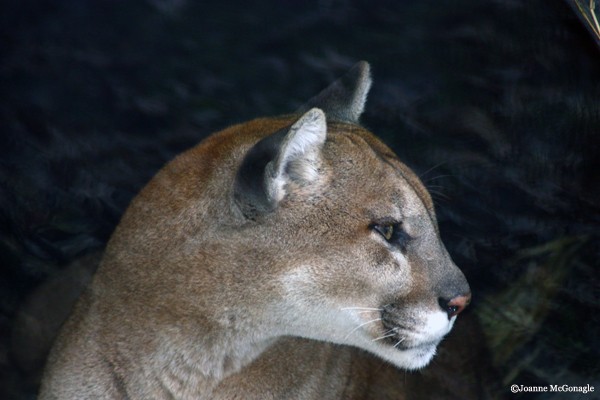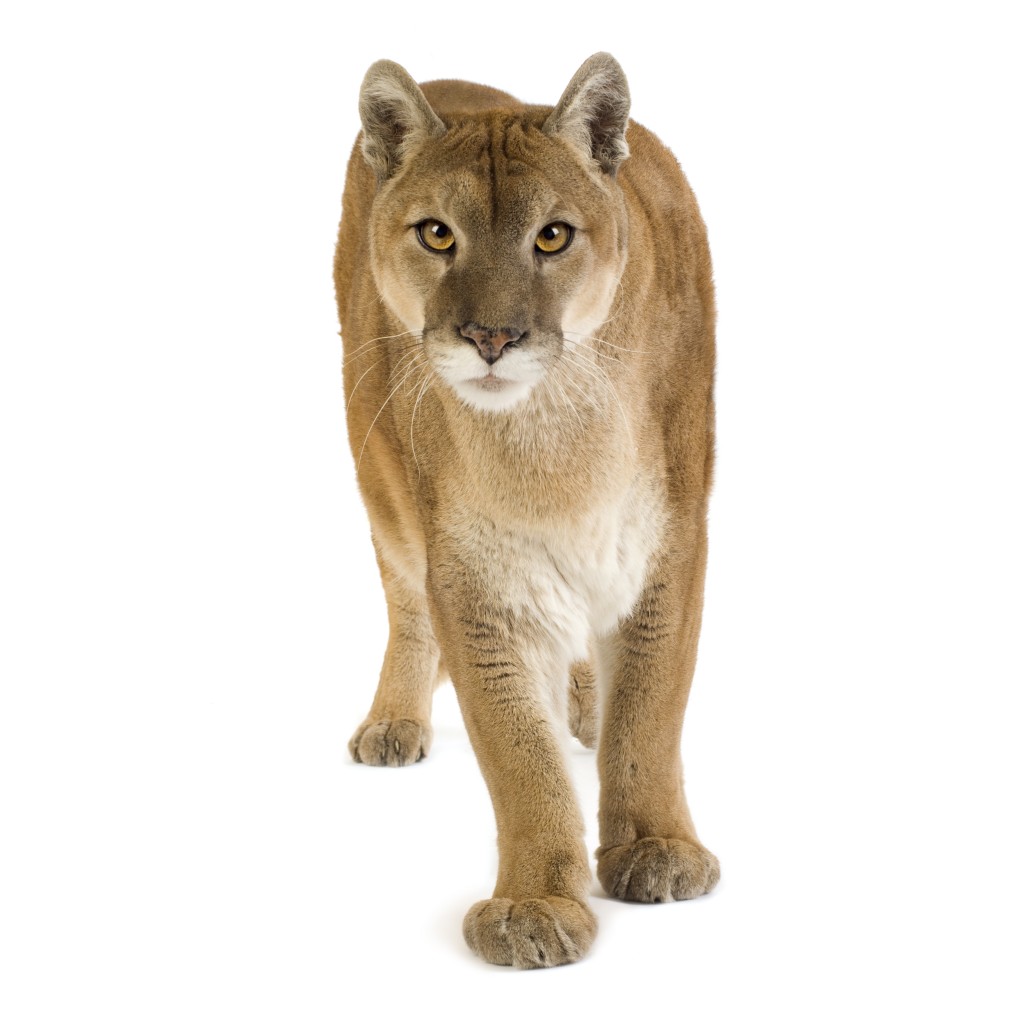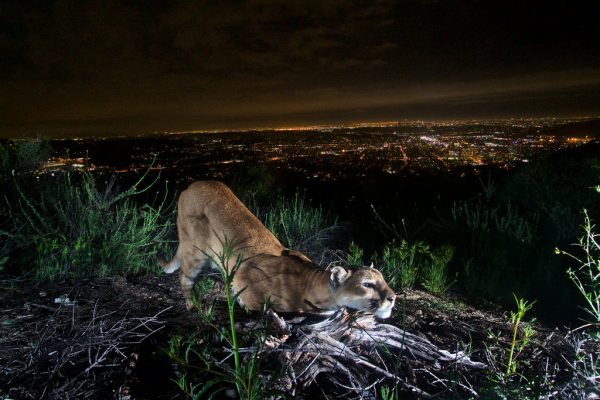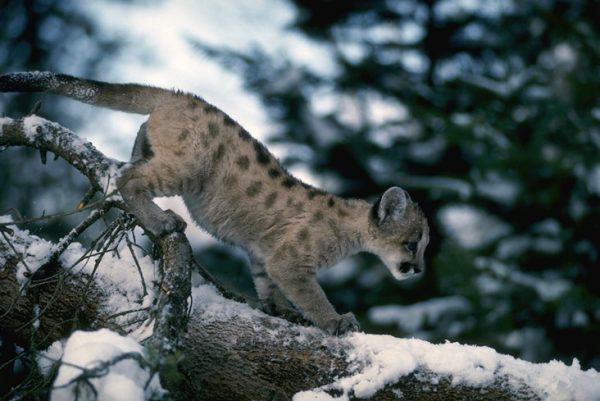
WHAT DO MOUNTAIN LIONS EAT?
A recent article in the SFGate leads with the headline: Study finds mountain lions are feasting on house pets. The article shows an image of a mountain lion isolated on a dark black background. The article begins “A pet owner’s nightmare, their dog or cat being eaten by a mountain lion, appears to happen with some frequency, according to a new report from the Department of Fish and Wildlife.”
The SFGate article goes on to discuss the Report to the Fish and Game Commission Regarding Findings of Necropsies on Mountain Lions Taken Under Depredation Permits in 2015.
The report detailed that 107 mountain lions were killed last year legally under provisions of special depredation permits. Of those 107 lions, the stomach contents of 83 were analyzed, and 52 percent were found to have eaten cats, dogs or other domestic animals, the report said. Only 5 percent had eaten deer, which are supposed to be their favorite prey, but are harder to catch than house cats. Of the rest of the lions detailed in the report, 16 percent were not studied, 9 percent had empty stomachs, and 18 percent had contents that were too digested to be identified.
The article then takes the liberty to sensationalize further…
If pets also accounted for a good share of that 18 percent, that would mean more than 60 percent of the lions in the study ate cats, dogs and other domestic animals.
If….if pets also accounted for… that isn’t how data is interpreted.
This article leads with click bait style headings and writing. Preying on pet owner’s fear that their own beloved pet will be eaten by a mountain lion, and then implying that this happens with some frequency. This article plays upon a misinterpretation of the mountain lion data to instill fear and maligns the mountain lion.
Shedding Some Light On the Mountain Lion Data

According to a recent report, which detailed the findings from the analysis of 83 mountain lions, 52 percent of those lions were found to have consumed cats, dogs, or other domestic animals. This implies that domestic animals are frequently targeted by mountain lions. Surprisingly, only 5 percent of the analyzed lions had consumed deer, which are widely believed to be their preferred prey. However, it is important to note that this data only pertains to the lions that were legally killed under special depredation permits.
Contrary to the report’s findings, it is widely acknowledged that mountain lions are opportunistic hunters that consume a diverse range of prey, varying from small rodents to larger predators. Nevertheless, when it comes to their most common prey, the consensus among experts is that deer, specifically mule deer, are overwhelmingly targeted by mountain lions. These big cats are known to actively pursue and hunt deer, making them a crucial part of their diet.
While the report sheds light on the stomach contents of lions killed under specific circumstances, it is essential to understand that it may not fully represent the overall prey preference of mountain lions. The general understanding from extensive research and observation is that deer, particularly mule deer, play a prominent role in the diet of most mountain lions.
The SFGate article leads the reader to believe that the 107 mountain lions killed on depredation permits are representative of the entire mountain lion population in California. There are an estimated 5,000 of the big cats in the state of California therefore approximately 1% of all mountain lions in the state were found to have domestic pets in their stomachs, not 52%.
It is also important to note that the 107 mountain lions killed on depredation permits were in fact killed because they were targeted as the cat that ate pets or livestock. Therefore it stands to reason these mountain lions targeted to be killed would be more likely to have domestic animals in their stomachs.
The article should have highlighted the fact that 14% of the mountain lions taken with depredation permits were killed for no reason because 5% had deer in their stomachs and 9% had empty stomachs. This shows that they targeted and killed the wrong cat, if indeed a lion was the culprit in the first place.

Frequently Asked Questions
WHAT DO MOUNTAIN LIONS EAT?
According to the report, a total of 107 mountain lions were legally killed last year under special depredation permits. Out of these lions, the stomach contents of 83 were analyzed, shedding some light on their dietary preferences. Surprisingly, it was found that 52 percent of the analyzed lions had consumed cats, dogs, or other domestic animals. This indicates that mountain lions do not shy away from opportunistically hunting and preying on domestic pets that may be more readily available in human-populated areas.
Interestingly, the report also revealed that only 5 percent of the analyzed lions had eaten deer, which are typically considered their favorite prey. This suggests that deer may be harder to catch for mountain lions compared to smaller domestic animals. However, it is important to note that this analysis is limited to a specific sample and may not represent the overall diet of all mountain lions.
To gain a more comprehensive understanding of the mountain lion’s diet, it is beneficial to look at additional research. For instance, a study conducted by Santa Ana’s Department of Natural Resources tracked a specific mountain lion named Brokenleg over a period of 21 months. The findings of this study showcased a diverse range of prey consumed by Brokenleg, including badgers, elk, coyotes, beavers, raccoons, mule deer, porcupines, pronghorns, domestic dogs, rabbits, and even mountain sheep. This detailed analysis gives us a broader perspective on the variety of prey that mountain lions can target and consume in their natural habitats.
While the report’s analysis focused on a specific sample and the study of Brokenleg provides a more extensive understanding, it is clear that mountain lions have the ability to adapt their diet to the available prey in their environment. From domestic animals to larger predators and even ungulates, mountain lions exhibit opportunistic hunting behavior, showcasing their versatility as hunters.

WHAT DO MOUNTAIN LION CUBS EAT?
Mountain lion cubs primarily consume their mother’s milk during the early stages of their life. This exclusive diet typically lasts for up to seven weeks until they gradually transition to solid food. Once they are able to wean, their mother plays a crucial role in providing sustenance for the cubs. She brings back meat for the litter to devour, ensuring their nourishment and growth. At approximately four to six months of age, when they are fully weaned, mountain lion cubs begin to venture into hunting their own prey. Initially, they target smaller animals such as rabbits and skunks as they learn and develop the necessary skills. As they continue to mature, their hunting abilities improve, enabling them to pursue and successfully capture larger prey. Eventually, adult mountain lions become adept at taking down animals like deer, elk, and other common prey species.
WHAT OTHER ANIMALS DO MOUNTAIN LIONS EAT?
How frequently do mountain lions consume different prey species?
Based on the observations of Brokenleg’s diet over 21 months, he consumed 35 badgers, 19 elk, 15 coyotes, 10 beavers, 6 raccoons, 5 mule deer, 4 porcupines, 2 pronghorns, 2 domestic dogs, 1 rabbit, and 1 mountain sheep. These numbers provide insights into the frequency of consumption of different prey species by Brokenleg, indicating a varied diet.
How does the diet of mountain lions vary over time?
The diet of mountain lions can vary over time. In the case of Brokenleg, his diet was observed over a period of 21 months, during which he consumed a range of prey species including badgers, elk, coyotes, beavers, raccoons, porcupines, pronghorns, domestic dogs, rabbits, and mountain sheep. This suggests that mountain lions may adapt their prey selection based on availability or other factors.
Are there any surprising or unexpected prey items in a mountain lion’s diet?
Yes, according to the information from the Santa Ana’s Department of Natural Resources, a mountain lion named Brokenleg consumed 35 badgers, which may be considered surprising as badgers are not typically thought of as mountain lion prey. Additionally, the consumption of domestic dogs is also unexpected.
What other animals, besides deer, do mountain lions commonly prey upon?
Mountain lions commonly prey upon a variety of animals including badgers, elk, coyotes, beavers, raccoons, porcupines, pronghorns, domestic dogs, rabbits, and mountain sheep.
ARE MOUNTAIN LIONS DANGEROUS TO PEOPLE?
The question of whether mountain lions are dangerous to humans is often asked by those seeking to understand the potential risks involved in encountering these animals. While mountain lions, also known as cougars or pumas, are predatory by nature and possess the ability to cause harm, their actual danger to humans is relatively low.
Mountain lions are widely distributed across North and South America and have been known to coexist with humans in certain regions. However, like any wild animal, they should be treated with caution and respect. While rare, incidents involving mountain lion attacks on humans have been reported. These instances are typically isolated and occur when humans unknowingly encroach upon the mountain lions’ territory, provoke the animal, or, in rare cases, when the animal is sick or injured.
It is crucial to understand that mountain lions generally prefer to avoid human encounters and will usually retreat if aware of human presence. Moreover, efforts by wildlife management authorities have contributed to educating the public on appropriate precautions to minimize the risk of confrontations with mountain lions. Such precautions include staying vigilant, particularly in areas known to have mountain lion populations, avoiding hiking or jogging alone at dawn or dusk when these animals are most active, and making noise to alert them of human presence.
In conclusion, while mountain lions have the potential to pose a danger to humans, the actual risk of encountering a dangerous situation is relatively low. By understanding their behavior, respecting their habitat, and taking appropriate safety measures, humans can coexist with these magnificent creatures with minimal concern for personal safety.
HOW MUCH DO MOUNTAIN LIONS EAT?
Mountain lions have an impressive appetite, as they can consume an astonishing amount of meat in a single meal. On average, they devour between 20 and 30 pounds of meat, especially after successfully hunting down a large animal. In stark contrast, humans typically consume only four pounds of food per day, and even that is considered a relatively high intake. Therefore, in terms of quantity, mountain lions far outstrip humans in their eating habits.
The article mentions that the Department of Fish and Wildlife has confirmed that coyotes and other predators attack and eat pets at high levels. Yet, the cat takes the rap.
We have mountain lions up here. There is only a lion that has been agressive the last few months and are killing our pets. One lady’s little chiauahua was grabbed right in front of her and the lion growled at her when she screamed. That has not happened much until recently. I am worried about my old Shunta in the back yard since the lions are wandering around town at night.
Theresa, wow! Is this a new development that the lions are wandering around town? Is there a way to bring your pet indoors at night?
One lady and this is in Deadwood and her new puppy ran to door with a lion behind her by 2 feet. Now she has a pee pad for her puppy. Shunta just goes out to pee and then we let her in. I am hoping houses are too close together for lion to jump our fences. Deer and mountain lions both have been in town especially since the fire in 2002 when a lot trees and grass has been burned.
I hate the way facts get twisted. It’s especially bad when they are twisted as heinously as they are in the news item you’ve refereneced.
Yeah,I think sometimes people are just looking for a reason to hunt the cougars. The mountain lions have a hard time birthing their kittens,then trying to keep them alive until maturity;too many predators kill them. The cats need more protection than they’re getting.
wouldn’t it be great if before a story went to print, all facts were CONFIRMED; we send our apologies to the mountain lion ???